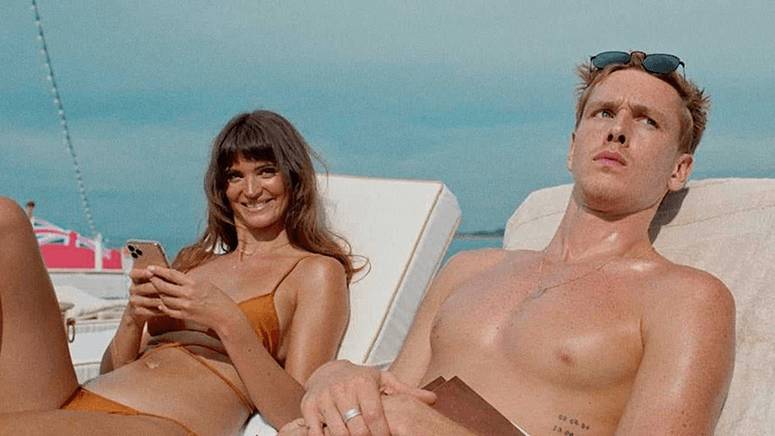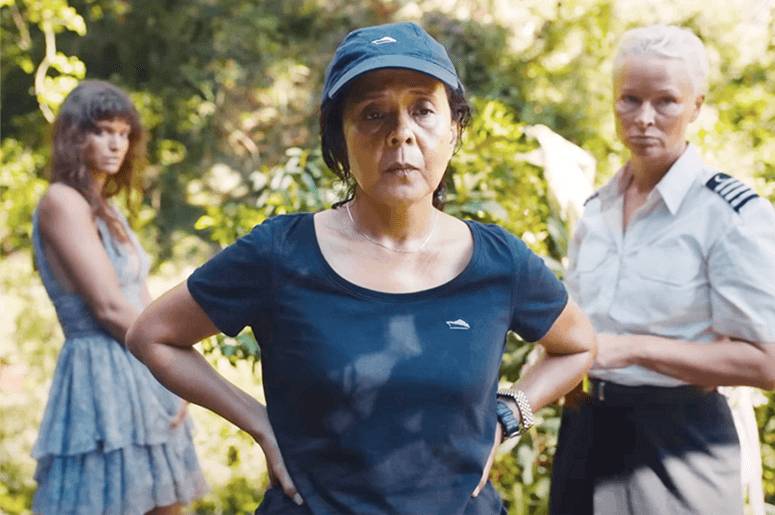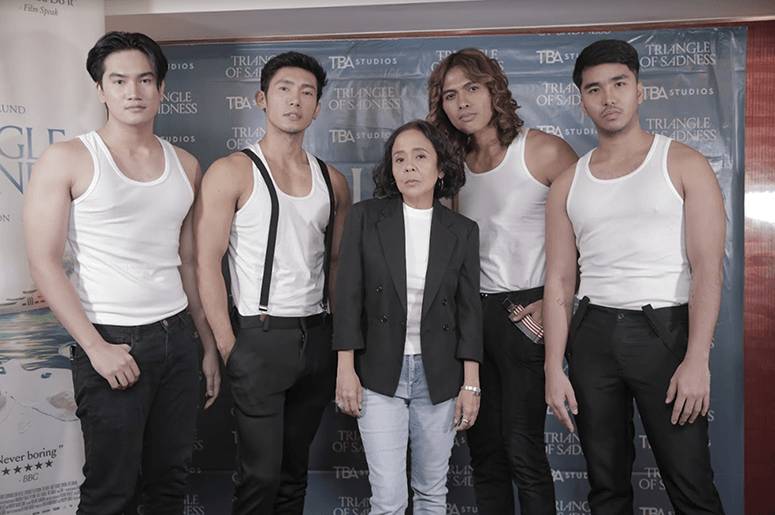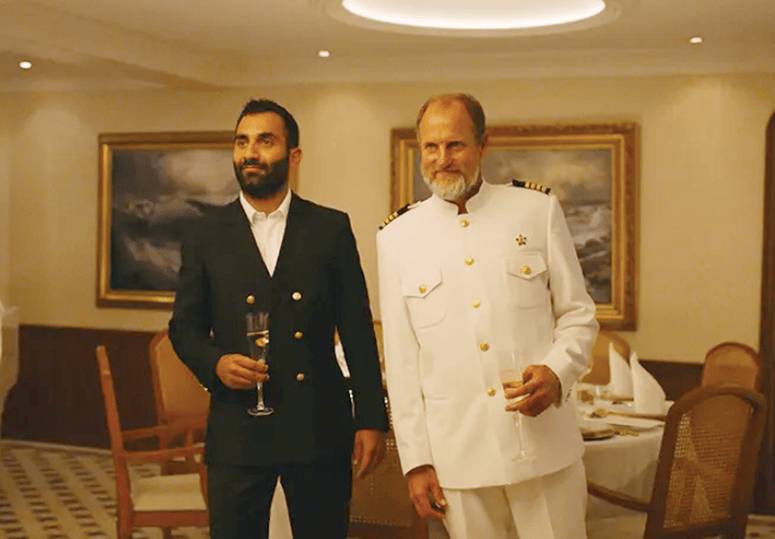Dolly de Leon is the new captain. Deal with it.
You don’t see much of Dolly de Leon at first in Ruben Östlund’s Palme d’Or-winning black satire Triangle of Sadness—the Filipino actress shows up outside the cabin door of a luxury yacht, where models Carl (Harris Dickinson) and Yaya (Charlbi Dean) are sleeping away the morning, asking if she can clean the room already.
As Abigail, the “toilet cleaner” among many other Filipino staff on this super-yacht, overstuffed with corrupt wealthy and influencers, she has a muted tone at first. But she finds her voice by the third act of Östlund’s first English-language feature.
De Leon was at the Shangri-La Red Carpet Premiere Screening, surrounded by shirtless Filipino boy toys (“Hello, cutie pies!”) and taking a moment to ask Filipinos to watch the film and to dedicate the screening to her co-star, Dean, who passed away earlier this year at age 32 (“Please spread the word about her great talent”).

Filipinos remember The Poseidon Adventure, even if they never grew up watching it. In that ’70s disaster flick, a luxury cruiser is capsized by a tsunami-like wave. A handful of passengers try to survive. In Triangle of Sadness, the “normal” order of modern society is also capsized—those with skills survive, while others just sit by and watch with meek, bovine stares.
The order of things is established early on with a blistering takedown of the fashion industry. We meet Carl, a down-trending male model, on a shoot. A TV interviewer instructs the models to flip back and forth between their two expressions: the Balenciaga scowl for “grumpy brands” that say, “Keep away if you don't have money”; and the H&M “smiley look” that says “Suddenly I’m dressed in something way less expensive!” During the runway show, a large screen blares out ironic, all-caps messages: “EVERYONE’S EQUAL NOW… LOVE NOW… ACT NOW… OPTIMISM MASQUERADES AS CYNICISM…”

Carl earns less than his influencer girlfriend Yaya, yet he still is expected to grab the dinner check, and this sets up a dialogue on gender roles and “bullsh*t feminism.” Nevertheless, the two take a luxury cruise (on Yaya’s invite) and settle in. The captain (Woody Harrelson) is hermited in his cabin, drinking himself to oblivion. The crew members, led by peerlessly correct and polite Paula (Vicki Berlin), are eager to collect huge tips and gifts from their exorbitantly rich passengers at the end of the voyage: “Money! Money! Money!” they all chant together.
Östlund’s satire is not subtle, but it’s sharply written, and goes for the jugular. As we meet the other passengers, including a pair of rich Russians who’ve made a fortune “selling sh*t” (fertilizer) under Communism, we learn that they’re all ghastly and unpleasant in various ways. A kindly old couple proudly chirps on about making “millions” selling hand grenades and landmines, until “those UN regulations” cut into their profits. Carl becomes our eyes on this yacht trip, which quickly turns into a dinner banquet of tossing and turning and, eventually, mass projectile vomiting. The rich are shown as helpless grotesques, at the mercy of nature’s upheaval. (Seriously, we haven’t seen this much puking since the pie-eating contest in Stand by Me.)

A “triangle of sadness” refers to a bit of landscape above a model’s nose and below the forehead that possibly requires Botox, but it also refers to Östlund’s three-part journey. The first part shows us a microcosm of human relationships through Carl and Yaya’s constant spats; the second shows the larger macrocosm of greed and capitalism (with a goofy-grinning Harrelson as the left-leaning captain, trading drunken quotes with an equally intoxicated Russian sh*t seller); and the third simply wipes the table clean of all the pieces.
By Part 3 (The Island), we’re left with a handful of survivors. And, not to give away too much, but one of them has the necessary life skills to hunt, fish, and build fires, and she quickly declares herself the group leader. “Who am I?” she demands of each hungry, thirsty, bedraggled passenger as she doles out lumps of cooked octopus. “The captain,” they recite, one by one, as she tosses them an extra morsel.

It’s this reversal of fortune that carries Triangle of Sadness to comic heights. Abigail, once the mute cleaner of vomit-strewn dining rooms, suddenly holds all the cards. And she knows how to game the system. And Filipino actress De Leon owns—and earns—every moment.
In the tradition of the carnival throughout European history, this is the flipside of social order: In carnivals, the fool wears the crown, the people lead the parades, and the rich simply allow this “escape valve” of satire once a year to head off more, er, serious upheavals. In this scenario, stranded on an island, it’s worth noting that both the haves and the have-lesses are finally rendered equal: All are under the thumb of a whimsical ruler, who is enjoying her time in the spotlight.
And De Leon is great here, with lines that will make perfect Oscar clips. (“This is really bad. This is really, really bad,” she sternly warns the males, when her chocolate pretzels go missing. And we know she means business.) And it’s true that this film is best viewed with a large group of Filipinos in the cinema, for maximum appreciation of De Leon’s spotlight role, and the layers of irony underpinning Östlund’s examination of society’s soft, vulnerable underbelly.
* * *
Triangle of Sadness is now showing in local cinemas. For more updates, visit tba.ph and follow TBA Studios on Facebook, Instagram, Twitter, TikTok, and Youtube. Join the conversation online using the hashtag #TriangleOfSadnessPH. Thanks to TBA Studios for the screening, and the fine goodies, which included a barf bag, chocolate pretzels, and a first aid kit. ’Cause you never know.


